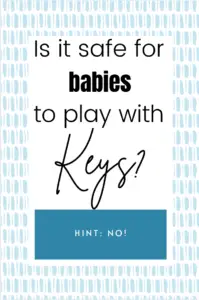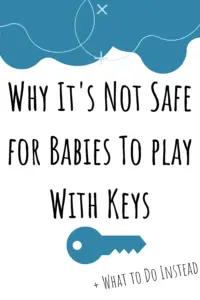
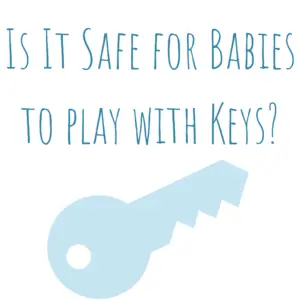
Is it safe for my baby to chew on keys? Is it safe for my baby to play with keys?
No and No.
But what about my toddler? They don’t put things in their mouth. So that’s harmless, right?
Wrong.
In this article, we’ll be discussing why you shouldn’t let children of any age play with keys, as well as provide some alternatives.
Note: This post may contain affiliate links. This website is largely reader-funded through making purchases using affiliate links (at no additional cost to you). Thank you for your support!
Keys are dangerous and not safe for children.
Children (of any age) should not be playing with – or even handling keys.
It goes beyond the dirt and grime that is found on most keys, though that may be reason enough not to let your child play with them. If you’re like me, your keys often end up at the bottom of your bag, which definitely isn’t the cleanest place in the world!
The bigger reason why you should not let your child play with your keys, especially babies who put things in their mouth, is because of lead.
Yes, lead!
According to the EPA, “lead can affect almost every organ and system in your body. Children six years old and younger are most susceptible to the effects of lead”. Even low levels of lead in children can result in a slew of problems including:
“In rare cases, ingestion of lead can cause seizures, coma and even death.”
When it comes to keys, children can ingest lead by putting keys in their mouth (direct ingestion) or after touching keys and then putting their hands in their mouth. Leaded objects can also create lead dust, which can be inhaled or touched and then ingested.
The law does limit the amount of lead that can be present in children’s toys to 90 parts per million.
However, keys are not considered toys. There are currently no regulations on the amount of lead that can be found in keys (or most other products meant for adults, for that matter).
The average consumer can’t determine how much lead is in a particular product.
There is a special machine that tests lead levels in products (XFR), but unless you buy one (they’re tens of thousands of dollars, by the way!), rent one, or hire someone who has one, you won’t know for sure how much lead is in your keys.
One such person you can hire is Tamara Rubin, an internationally recognized, award winning lead-poisoning prevention advocate.
As part of her advocacy work, she tests tons of products for lead and shares the results on her site. You can see the results of the various keys Tamara Rubin has tested for lead here. Spoiler alert: they all have shockingly high levels of lead. We’re talking various brands of house keys with 10,700 ppm lead, 12,800 ppm lead, 9,441 ppm lead, etc. As a reminder, anything about 90 ppm is considered unsafe for children.
Since keys are a known source of high lead amounts, it’s better to err on the side of caution and just assume that one or more of your keys is leaded.
Promise you’ll never let your child play with or chew on your keys ever again!
It’s understandable why our keys are so appealing for babies and young children. Among other reason, keys are:
Keys are often given to babies by unsuspecting parents because they are so readily available. In the grocery store? At a restaurant? Baby is starting to fuss and parents often find themselves scrambling for something distracting. Keys are so readily available so it’s an easy trap to fall into if you didn’t know any better. But now you do know better. Keys are not safe for babies. Keys are not safe for toddlers. Keys are not safe for children at any age to handle.
If your baby or toddler loves keys, here are some safer alternatives:
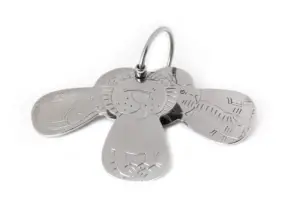
Kleynimals: These are toy keys from a company called Kleynimals. They are the perfect replacement for real keys. They provide all the same features that babies and young children are drawn to in real keys, but these are safe.
Kleynimals are made with 100% food-grade stainless steel. We also like that Kleynimals are made in America. They also come with a muslin pouch so you can toss them in your bag without them getting dirty.
We bought these for my 8 month old when we were looking to offer her a variety of textures and materials for teething. It turns out our daughter loves chewing on her Kleynimals! It turned out to be one of her favorite teething toys. We think it’s because the Kleynimals offered such a cooling sensation that was different from the rest of the teething toys we had. We never did any of the frozen teething toys after reading they can do more harm than good!
Other than the fact our daughter loved them, we loved that they are safe and non-toxic. Not to mention, they are super cute! The ‘keys’ are shaped like a lion, giraffe, and elephant!
Kleynimals offers customized engraving on the back of the lion. This makes a great keepsake gift!
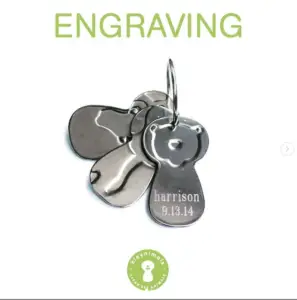
Here’s some examples of how Kleynimals can be played with (all these pictures can be found on our Instagram page, so make sure you’re following us there!):
Kleynimals are great in combination with the book Good Night, Gorilla.
If you aren’t familiar, this book takes place at zoo, and features the zookeeper’s keys, which the gorilla uses to unleash all the animals.
Again, these two products together would make a great gift!
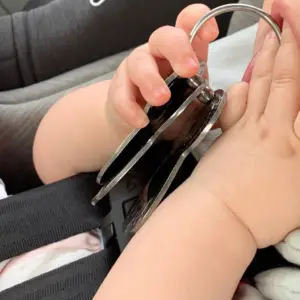
Kleynimals a great teething toy to keep on hand for road trips, no matter how long.
They can be use to entertain the baby in multiple ways – chewed on, shacked, looked at, talking about the different animals, etc.
Pros: Stainless steel material, high-quality (heirloom quality), customizable, comes with a storage bag
Cons: Expensive
Measuring Spoons from IKEA – These measuring spoons from IKEA have many of the same features of the Kleynimals, but a fraction of the price. Though not technically a toy, for less than $5, you can give these measuring spoons to your child to play with and chew on. They clearly aren’t as cute as Kleynimals, but like Kleynimals, they are made of stainless steel and jingle when you shake them. They provide the same cooling sensation for teething babies.
Pros: Stainless steel material, cheap price, can be used a measuring spoons
Cons: No cuteness factor
Toy Car Keys by B. Toys – These toy car keys by B. Toys (found at Target) are also a great, cheap alternative to real keys for kids. They’re made of stainless steel and plastic. Although we try to minimize plastic toys and don’t love the idea of young children putting plastic in their mouth, it’s definitely the better alternative to chewing on leaded keys! We also try to avoid battery-operated toys, but it’s easy to leave those out. We love the stainless steel portion of these keys. Not only do they make the keys more realistic, they are safer to chew on and will provide the child with a cool surface to teeth on.
Pros: Stainless steel material (on a portion), most realistic to real keys, cheap price
Cons: Plastic portions, battery-operated
After finding out that most keys are leaded, you may also be looking for alternatives for yourself.
It’s easy to stop giving keys to babies and children, but adults still have to come in contact with these potentially leaded items daily.
One alternative recommended by Tamara Rubin is to switch house keys to ones made out of aluminum. They are harder to find and are slightly more brittle and thus more likely to break. But they are a much better alternative when it comes to lead. Most keys are intentionally made with heavily leaded brass. It ensures they key won’t rust or corrode over time, is durable yet soft enough to be cut for customization.
Another alternative to leaded keys is to use keyless entry. Something like this Google Next x Yale Lock. It allows you to lock and unlock your front door with your phone or key code.
We use keyless entry for both our home and our cars.
Perhaps leaded keys will soon be a thing of the past!
Thank you for reading & for your support of this website! This website is largely reader-funded through making purchases using affiliate links (at no additional cost to you).
Please also consider sharing with your friends & family! Especially when it comes to spreading awareness around hidden safety concerns, like lead.
